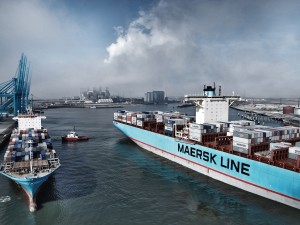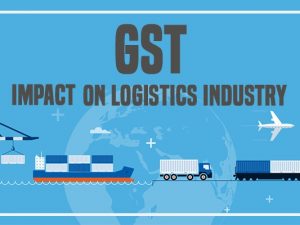Maersk Line has moved the first ever container shipment from Visakhapatnam to Nepal. Maersk Line’s maiden rake left Vishakhapatnam will offer a guaranteed fixed transit time from load port till ICD Birgunj. Chennai Express which has high schedule reliability will call on Vishakhapatnam once a week with multiple feeders sailing during the week that will help customers to carry shipments globally. This service offering is aimed at ease of doing business and increasing transparency by providing customers with an end-to-end delivery mechanism. This entails one stop solution such as online payment, handling documents, DO issuance and clearing cargo all at Nepal itself.
Read More »Safexpress launches ultra-modern Logistics Park in Amritsar
The development of the Safexpress Logistics Park has been done on a land area of 25,000 square feet. The establishment of this Logistics Park will drive the economic growth in the Punjab region. Vineet Kanaujia, Vice President – Marketing, Safexpress said, “Amritsar is one of the largest and most rapidly growing cities of Punjab. It is also a very important center from the perspective of supply chain and logistics. The growth trend in Amritsar is likely to improve significantly in times to come as the government is planning numerous initiatives around the city. Punjab Government is taking various steps to provide fiscal incentives to investors in Amritsar to speed up the industrial development of the belt. Amritsar is industrially developed, but still has a lot of scope for further development, provided its logistics falls in place.”
Read More »GST lowers the effective service tax on gross freight by 10-12 %: Indus B2B Solutions
“With tax rates, finally in place for most goods and services, it is now known what gets cheaper and which items get dearer in the GST era. Freight charges are expected to come down by four to 10 per cent following the imposition of a uniform five per cent GST rate for goods transport in all modes, and the input tax credit benefit for transporters, third-party logistics firms, common carriers, packers and movers and freight forwarders. However, there is a larger worry; uncertainty about the extent to which GST will impact the supply chain ecosystem and, eventually, customers still prevails. The answer to this lies in the transition rules, which are yet to get a green signal,” informs Piyush Kumar, CEO, Indus B2B Solutions. Apart from that, E-way bills rules; a key for the transport and logistics sector are also yet to be decided. These rules deal with the registration of goods worth more than Rs 50,000 when moved within the state or outside it. As far as the delay in E-way bills rules is concerned, the debate prevails over whether these rules should be applicable for products which are not under the GST ambit such as alcohol and petrol. Meanwhile, rules relating to input credit, refund, invoice and registration, among others, have been finalised and provide much-needed clarity on many aspects of GST. At present, the retail goods booking and delivery service providers (goods agents) levy a service tax on gross freight charges displayed on consignment note at 4.75 per cent. Freight cost is expected to drop by over four per cent with implementation of goods GST. However, in the case of contract transport business and door delivery transport …
Read More »GST leads to lower inventory cost: Apollo International
Commenting on the recent announcement of GST Bill, Raaja Kanwar, Managing Director & Vice Chairman, Apollo International, says, “Currently, each of India’s 29 states taxes goods that move across their borders at different rates. Apart from that, Corporate State tax of two per cent is levied for inter-state goods transfer. We believe that uniform taxation covering rail transport, air transport and road transport under five per cent slab according to the new GST Bill will lower the interstate tax burden. It will also ensure major consolidation in the industry. We expect an improvement in the logistics time-frame after phasing out the border check-posts resulting in greater operational efficiency thanks to faster, increased number of deliveries, along with reduction in logistics cost during transit.” “Currently, the existing interstate taxation system has forced companies to create and maintain warehouses in each state. There are around 20-30 warehouses per company, one in every state, in addition to this, there are 20-30 carry & forwarding agents per state, making the supply chain longer and inefficient. GST tax will be levied on transportation of goods and full credit will be available on interstate transactions. We are expecting a decrease by 1.5-2 per cent in logistics costs account of optimisation of warehouses, leading to lower inventory costs which are set up across states to avoid paying two per cent corporate sales tax and phasing out of interstate sales tax,” he adds.
Read More »Industry expects a boost if GST gets implemented: Patel Integrated Logistics
Areef Patel, Vice Chairman, Patel Integrated Logistics, informs, “Operating costs will be lowered considerably and the logistics industry will get a significant boost if GST is implemented on schedule this year. A uniform tax structure and the creation of a one nation one tax regime will lead to seamless movement of goods and services from one state to another. With the subsuming of several taxes into one common tax structure, there will be no lengthy paperwork at state trucking points and long winding queues will become a thing of the past. There will be a huge rationalisation of expenditure as logistics players will be in a position to optimise their warehousing needs and restructure their infrastructure strategies. However, it needs to be mentioned here that a single registration mechanism needs to be facilitated by the government for the logistics sector like the insurance and banking sector.”
Read More »Freight cost expected to drop by 4 per cent with GST on roll: Tiger Logistics
Harpreet Singh Malhotra, Chairman & Managing Director, Tiger Logistics (India), says, “Transport services (railways, air transport), will be under the five per cent category because their main input is petroleum, which is outside GST ambit. Freight charges are expected to come down by four to10 per cent following the imposition of a uniform five per cent GST rate for goods transport in all modes, and the input tax credit benefit for transporters, third-party logistics firms, common carriers, packers and movers and freight forwarders. At present, the retail goods booking and delivery service providers (goods agents) levy a service tax on gross freight charges displayed on consignment note at 4.75 per cent. If the input tax credits are taken into account on GST on purchase of vehicles, tyres, insurance cover and other goods and services by common carriers, retail goods booking agents, the impact of five per cent service tax will be neutralised. So, freight cost is expected to drop by over four per cent with implementation of goods and service tax. The proposal to give input tax credit will encourage several unorganised truck-owners to register themselves under GST.”
Read More »Great opportunity for the 3PL trade: FFFAI
S Ramakrishna, Vice Chairman, FFFAI, says, “It was more or less clear that there would an increase of 0.5 per cent on tax which meant from 4.5 per cent service tax to five per cent in GST regime. After the advent of GST there will be uniform tax rates across borders and state boundaries will no more be a parameter for deciding the routes. Multi modal connectivity would be the prime factor for warehouse operators, who eventually need to rejig the warehouse locations. This should lead to supply chain model in more robust and efficient manner. This will lead to rationalisation of selecting warehouse, transportation etc which would provide competitive advantage to the industry.” “On the international trade, the government missed a great opportunity of Nil rate of GST from end to end supply like many countries in the world. The concept of reverse charges on international shipments on imports or payment of GST in export freight would definitely would have some measure of negativity especially knowing the refund process. The cost of otherwise competitive export market would also have some impact due to GST,” he added.
Read More »Cargo industry positive about GST roll out
The Goods and Services tax (GST), which aims to subsume most of the indirect taxes with the objective to lead the country towards ‘one nation, one tax,’ is almost ready for roll out. The government has kept large number of items under 18 per cent tax slab. Post GST implementation, most FMCG companies will be able to generate substantial savings in logistics and distribution costs as the need for multiple sales depots will be eliminated. Presently, FMCG companies pay nearly 24-25 per cent taxes including excise duty, VAT and entry tax. With a tax rate of 18 per cent under GST, there could be a significant reduction of six to seven per cent in taxes. According to the new GST Bill, Arun Jaitley, Finance Minister, Government of India, mentioned that road transport, air transport and rail transport will come under five per cent slab. Broadly, the GST regime will usher savings on logistics and will encourage the industry to be more organised. Industry veterans shared his views on the same.
Read More »Minister of Civil Aviation unveiled Advance Air Cargo Handling Training Programme
Air Cargo Forum India (ACFI) has launched Advance Air Cargo Handling Training Programme in the capital. The programme was launched by Ashok Gajapathi Raju Pusapati, Minister of Civil Aviation, Government of India in the presence of more than 125 numbers including senior government officials, members from various trade bodies and representatives of entire air cargo logistics industry. The programme is aimed to benefit the air cargo industry in India contributing to Government of India’s Skill India plans.
Read More »Apollo LogiSolutions launches first EXIM train from ICD Kashipur
Kashipur Infrastructure & Freight Terminals (KIFTPL), a Joint Venture between Apollo LogiSolutions Limited (ALS) and Indian Glycols Limited (IGL), has launched first EXIM (Export-Import) train from Inland Container Depot (ICD) Kashipur. Ajay Tamta, Minister of State for Textiles, Government of India flagged off the train covering connecting Kashipur with Mundra port. The EXIM train will be servicing all gateway port/ports like Mundra and Pipavav. The state-of-the-art private freight terminal in Kashipur, Uttarakhand, is spread over 41 acres of land, to cater the logistics requirements of region. Nearly 84 rakes of domestic transportations equivalent to 15000 TEUs of throughput has already taken place from this terminal since its operation. Raaja Kanwar, Vice Chairman & Managing Director, Apollo International said, “This is a significant step towards building integrated logistics capabilities to provide better facilities to our hinterland customers in the near future.”
Read More » Cargo Breaking News
Cargo Breaking News








